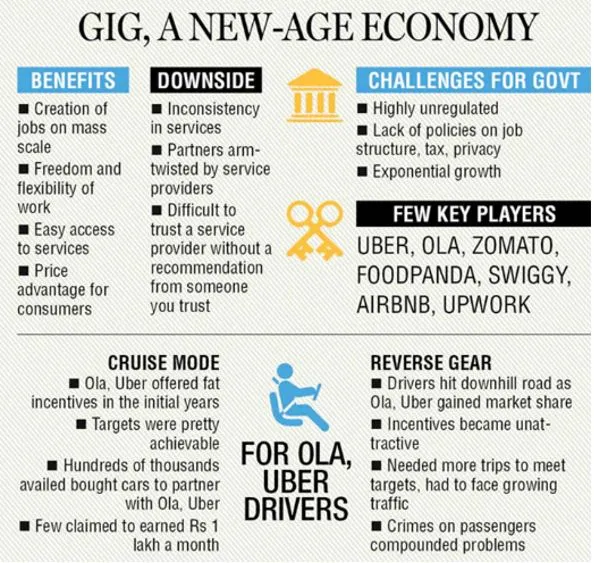

19th April 2025 (11 Topics)
Context
The Karnataka Platform-based Gig Workers (Social Security and Welfare) Bill, 2024 has gained significant attention due to its potential to be a pioneering law for the welfare of platform-based gig workers in India.
Why the Bill Was Needed?
- Gig Economy in Karnataka: Karnataka is home to around 2 lakh platform-based gig workers. They enjoy flexibility in their work but lack formal labor protection, which exposes them to
- National Context: The gig economy is a rapidly growing sector expected to provide 5 million jobs in India by 2030 (NITI Aayog, 2022). However, gig workers remain unprotected by traditional labor laws, leading to multiple instances of worker exploitation.
- Legal Landscape: In 2020, the Central government passed the Code on Social Security (CoSS) to define gig workers, but its implementation is still pending. In 2023, Rajasthan became the first state to introduce a law for gig workers. Karnataka's Bill aims to follow suit, protecting gig workers under a dedicated framework.
What the Bill Seeks to Address?
- Lack of Worker Protection: Gig workers often face arbitrary termination, unsafe working conditions, and lack of basic welfare benefits. The Bill aims to provide social security and welfare to these workers, filling the gap left by the absence of traditional labor laws.
- Welfare Fund Creation: The Bill proposes a welfare fund for gig workers. Platforms (aggregators) will be required to contribute a welfare fee of 1%-5% of each transaction, which will go directly to the welfare fund.

Key Features of the Bill
- Definition of Gig Workers: A gig worker is someone working on a platform-based model where work and payment are based on a contract, with no formal employer-employee relationship.
- The Bill aims to ensure social security benefits for these workers without applying full labor laws.
- Welfare Fund and Fee: A welfare fee (1%-5%) will be deducted from the workers' payments, and this amount will go towards a welfare fund.
- The Gig Workers Welfare Board will manage the fund, oversee worker registration, and implement social security schemes.
- Safety and Work Conditions: Platforms must ensure that workers have a safe work environment with adequate rest facilities. A 14-day notice period is mandated for worker termination unless the worker has caused bodily harm.
- Grievance Redressal:
- A two-tier grievance redressal mechanism will be put in place.
- If the internal dispute committee does not resolve the issue within 14 days, the grievance will be forwarded to the Welfare Board.
- Platform Obligations: Platforms must provide details of all gig workers to the Welfare Board.
- Platforms will also need to implement a Welfare Fee Verification System (WFVS), which will track welfare fee payments.
Fact Box: Who is a Gig Worker?
Government Initiatives for Gig Workers
|
PYQQ. Examine the role of ‘Gig Economy’ in the process of empowerment of women in India. (2021) |
More Articles


